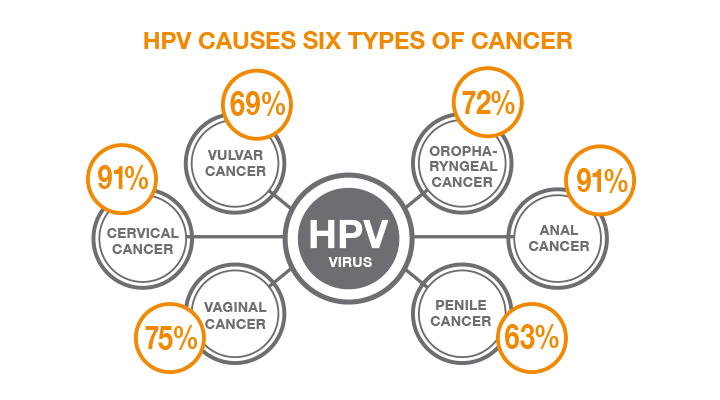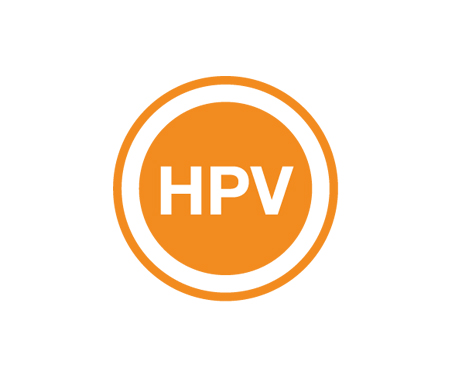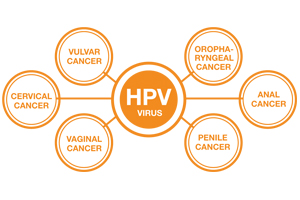You may be at increased risk for HPV infection
HPV is mainly transmitted through sexual contact and most people are infected with HPV shortly after the onset of sexual activity
You have had multiple sexual partners or have sex with a someone who has had multiple partners
Regardless of your risk factors for HPV infection, all young men and women need to be vaccinated. Women should get a PAP smear. Talk to your doctor about the vaccination and getting screened for HPV.

HPV has many types of cancer
HPV-related cancers are preventable
Human papillomavirus (HPV) causes most cervical cancers, as well as cancers of the anus, vagina, vulva, penis, and oropharyngeal (back of throat). The good news is there are approved vaccines that can protect against HPV-related cancers. Think About the Link® urges the use of HPV vaccines for cancer prevention, as recommended by the Centers for Disease Control and Prevention (CDC).
HPV & Cancer
91%
About 91 percent of cervical cancers are caused by HPV.
91%
About 91 percent of anal cancers are caused by HPV.
72%
About 72 percent of oropharyngeal cancers are caused by HPV.
About 75 percent of vaginal cancers, 69 percent of vulvar cancers, and 63 percent of penile cancers are caused by HPV.
Every year, more than 27,000 women and men are diagnosed with a cancer caused by HPV.
More than half (53 percent) of adults are not aware that the HPV virus can lead to cancer if untreated.
More than 12,000 women in the United States are diagnosed with cervical cancer caused by HPV.
The Virus

VPH
Human papillomavirus (HPV) is the most common sexually transmitted infection, affecting nearly all sexually active men and women at some point during their lifetimes. Most patients are unaware of the risks associated with HPV. 80 percent of adults are “not very” or “not at all” concerned they might be at an increased risk for contracting the virus. There is currently no cure for HPV; however, the body’s immune system may eventually clear the virus.

The Cancer Link
HPV usually has no symptoms, unless it is an HPV type that causes genital warts. Sometimes HPV infections that are not attacked and cleared by the immune system can lead to cell changes that may develop into cancer over many years. Among Hispanic women and men, cervical, vaginal, and penile cancers from HPV pose the greatest risk. Hispanic women are more likely to be diagnosed with cervical and/or vaginal cancer than white, non-Hispanic women. Hispanic men have higher rates of penile cancer than white, non-Hispanic men. With immunization, HPV-induced cancers can be avoided.
The HPV Vaccine is Cancer Prevention
There are three vaccines that protect against HPV-related cancers, and they have been approved as safe and effective. HPV vaccinations are given as a series of three shots over six months. All three vaccines have been approved by the FDA for women and two have been approved for men. The centers for Disease Control and Prevention recommends the HPV vaccine for boys and girls ages 11 or 12, however, all the HPV vaccines are available for women through age 26. One of the vaccines is available for men through age 21 and one is available for men through age 26. It is important to note that women who have been vaccinated still need to have regular Pap smear to screen for cervical cancer.
Did You Know?
About 14 million people in the United States become newly infected with HPV each year.
More than half of adults are not aware that the HPV virus can lead to cancer if left untreated.
73% of adults aren’t aware nearly half of all 14 to 19 year-old girls have HPV.
Hispanic women are twice as likely to be diagnosed with cervical cancer as white, non-Hispanic women.
Hispanic women are 1.5x more likely to die from cervical cancer.
Hispanic men have higher rates of penile cancer.
In all races and ethnicities, men have higher rates of HPV-associated oropharyngeal cancer than women.
62% of parents indicate their children’s pediatrician hasn’t stressed the importance of HPV vaccinations for cancer prevention.
Only three in five patients (62 percent) recommended to be vaccinated against HPV comply and receive the series on schedule. This is a far lower level of compliance compared to all other vaccinations.